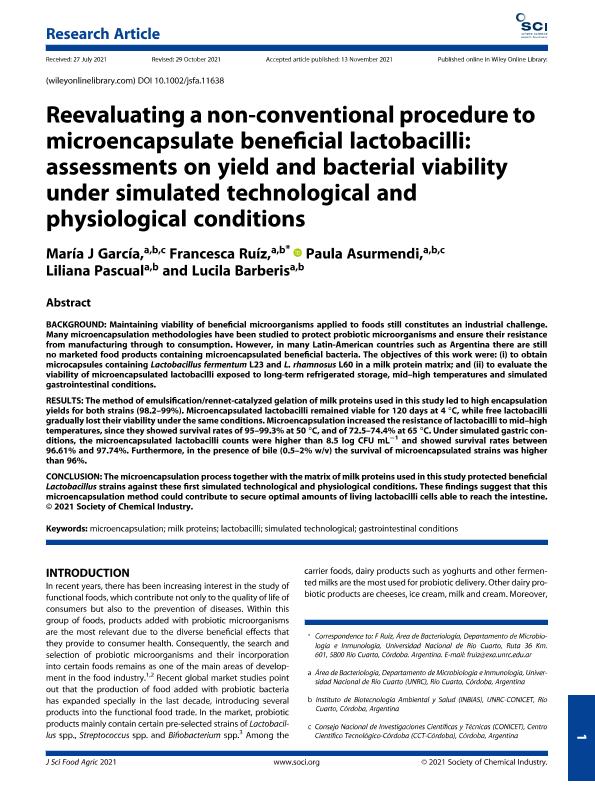Artículo
Reevaluating a non-conventional procedure to microencapsulate beneficial lactobacilli: assessments on yield and bacterial viability under simulated technological and physiological conditions
García, María José ; Ruíz, Francesca; Asurmendi, Paula
; Ruíz, Francesca; Asurmendi, Paula ; Pascual, Liliana Myriam; Barberis, Isabel Lucila
; Pascual, Liliana Myriam; Barberis, Isabel Lucila
 ; Ruíz, Francesca; Asurmendi, Paula
; Ruíz, Francesca; Asurmendi, Paula ; Pascual, Liliana Myriam; Barberis, Isabel Lucila
; Pascual, Liliana Myriam; Barberis, Isabel Lucila
Fecha de publicación:
05/2022
Editorial:
John Wiley & Sons Ltd
Revista:
Journal of the Science of Food and Agriculture
ISSN:
0022-5142
e-ISSN:
1097-0010
Idioma:
Inglés
Tipo de recurso:
Artículo publicado
Clasificación temática:
Resumen
Maintaining viability of beneficial microorganisms applied to foods still constitutes an industrial challenge. Many microencapsulation methodologies have been studied to protect probiotic microorganisms and ensure their resistance from manufacturing through to consumption. However, in many Latin-American countries such as Argentina there are still no marketed food products containing microencapsulated beneficial bacteria. The objectives of this work were: (i) to obtain microcapsules containing Lactobacillus fermentum L23 and L. rhamnosus L60 in a milk protein matrix; and (ii) to evaluate the viability of microencapsulated lactobacilli exposed to long-term refrigerated storage, mid–high temperatures and simulated gastrointestinal conditions. RESULTS: The method of emulsification/rennet-catalyzed gelation of milk proteins used in this study led to high encapsulation yields for both strains (98.2–99%). Microencapsulated lactobacilli remained viable for 120 days at 4 °C, while free lactobacilli gradually lost their viability under the same conditions. Microencapsulation increased the resistance of lactobacilli to mid–high temperatures, since they showed survival rates of 95–99.3% at 50 °C, and of 72.5–74.4% at 65 °C. Under simulated gastric conditions, the microencapsulated lactobacilli counts were higher than 8.5 log CFU mL−1 and showed survival rates between 96.61% and 97.74%. Furthermore, in the presence of bile (0.5–2% w/v) the survival of microencapsulated strains was higher than 96%. The microencapsulation process together with the matrix of milk proteins used in this study protected beneficial Lactobacillus strains against these first simulated technological and physiological conditions. These findings suggest that this microencapsulation method could contribute to secure optimal amounts of living lactobacilli cells able to reach the intestine.
Archivos asociados
Licencia
Identificadores
Colecciones
Articulos (INBIAS)
Articulos de INSTITUTO DE BIOTECNOLOGIA AMBIENTAL Y SALUD
Articulos de INSTITUTO DE BIOTECNOLOGIA AMBIENTAL Y SALUD
Citación
García, María José; Ruíz, Francesca; Asurmendi, Paula; Pascual, Liliana Myriam; Barberis, Isabel Lucila; Reevaluating a non-conventional procedure to microencapsulate beneficial lactobacilli: assessments on yield and bacterial viability under simulated technological and physiological conditions; John Wiley & Sons Ltd; Journal of the Science of Food and Agriculture; 102; 7; 5-2022; 2981-2989
Compartir
Altmétricas



